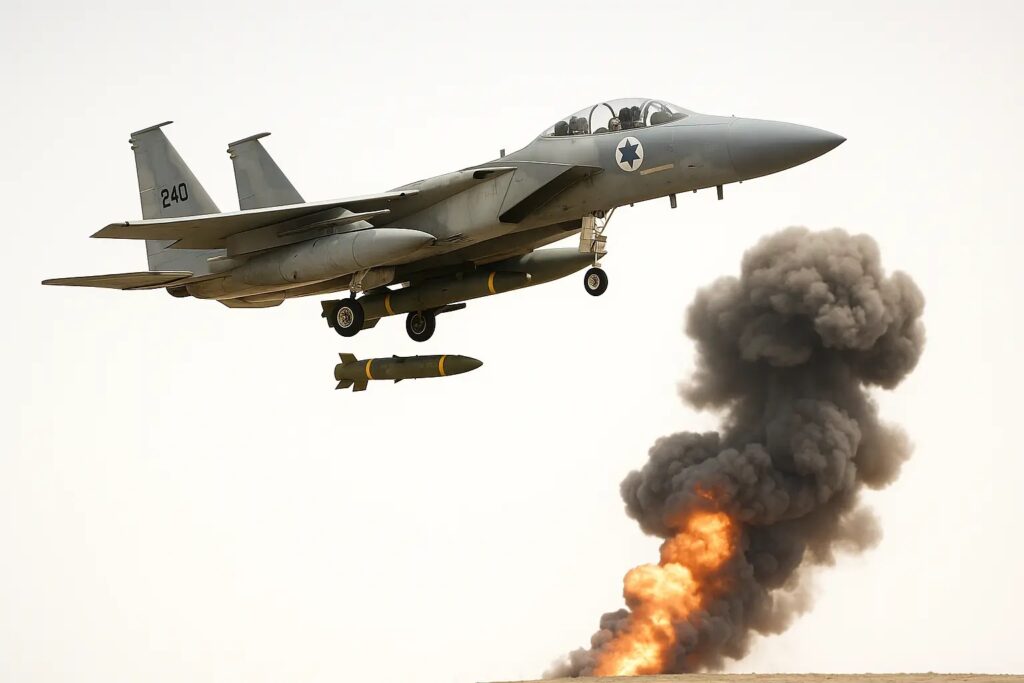Israel Launches Air Strikes on Iran as Middle East Tensions Soar
Background: A New Front in a Long Shadow War
Early Friday morning, Israel reportedly launched air strikes on Iranian territory, including areas near Isfahan, sparking fears of a wider regional escalation. The attack follows Iran’s recent drone and missile barrage targeting Israel, which Tehran called a response to the Israeli bombing of its diplomatic compound in Syria.
While Israel has not officially confirmed its role, Iranian officials and international news sources suggest Israeli warplanes or missiles were responsible for explosions heard across several Iranian cities.
What Happened in Iran?
According to Iranian state media, air defense systems were activated in Isfahan, the location of several key military facilities, including nuclear research centers. Loud explosions were heard around the Isfahan airport and near a military base, but Iranian sources claimed no significant damage or casualties occurred.
Flights in and out of Iran’s airspace were briefly suspended following the incident, and the country placed its air defenses on high alert.
Israel’s Silence – A Tactical Strategy?
Despite wide speculation, the Israeli government has remained silent. It neither confirmed nor denied its involvement in the overnight strikes, a common pattern in Israel’s strategic operations. However, anonymous Israeli officials told international media outlets that the strike was a “limited and targeted” response meant to avoid war, not start one.
This calculated ambiguity is not new—Israel has long pursued covert and overt operations against Iran’s nuclear and military infrastructure, often without taking public responsibility.
A Chain Reaction: What Triggered the Strike?
Iran’s Drone and Missile Attack
Just days before, Iran launched more than 300 drones and missiles at Israeli targets in what it described as retaliation for an Israeli airstrike on its embassy in Damascus. Most of those were intercepted by Israel’s Iron Dome system and allied support from the U.S., France, and the UK.
The Damascus Strike
The Iranian attack was itself triggered by an Israeli airstrike on April 1 that killed several senior Iranian military officials at a consulate building in Syria. That attack escalated a long-standing shadow war between Israel and Iran, fought through proxies and covert actions across Lebanon, Syria, Iraq, and now—possibly—directly on Iranian soil.
Global Reactions and Regional Fallout
U.S. Urges De-escalation
The United States, Israel’s closest ally, urged calm following the reported strike. U.S. officials said they had no involvement in Israel’s recent operation and that Washington does not seek further escalation. Secretary of State Antony Blinken reiterated America’s commitment to Israel’s defense but emphasized the need to avoid a broader conflict.
UN and Global Concern
The United Nations, alongside leaders from Europe and Arab states, expressed deep concern. The region is already on edge due to the ongoing war in Gaza and cross-border attacks involving Hezbollah in Lebanon.
With global oil markets rattled and regional alliances being tested, the latest developments could redraw the geopolitical lines of the Middle East.
What’s at Stake?
Israel’s Strategic Goals
For Israel, the primary goal remains the prevention of a nuclear-armed Iran. Israel views Iran’s nuclear program as an existential threat and has long conducted sabotage operations, assassinations of Iranian scientists, and cyberattacks to delay or derail Iran’s nuclear ambitions.
The strike on Isfahan, while limited, sent a powerful message: Israel can hit Iran directly if provoked.
Iran’s Calculated Restraint
Despite the loud rhetoric, Iran’s official response so far has been measured. The government denied significant damage and seemed to downplay the severity of the strike. Analysts suggest Tehran wants to avoid being dragged into an all-out war, especially with economic sanctions already crippling its economy and domestic unrest simmering.
Looking Ahead: Is War Inevitable?
The recent strikes mark one of the most direct Israeli attacks inside Iranian territory in years. Though both nations are trying to avoid full-scale war, the spiral of retaliation is inching dangerously close to open conflict.
With proxies across the region, nuclear concerns, and powerful allies on both sides, any misstep could ignite a regional firestorm with global consequences.
Final Thoughts
This latest chapter in the Israel-Iran rivalry shows just how fragile peace in the Middle East remains. While the world hopes for de-escalation, both nations continue to prepare for the worst behind closed doors. One thing is clear—this conflict is far from over, and the stakes have never been higher.

